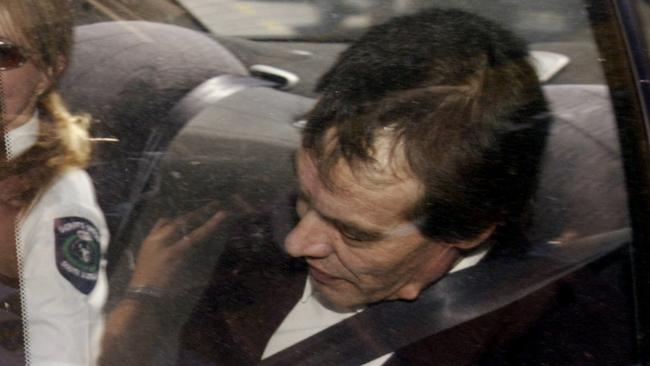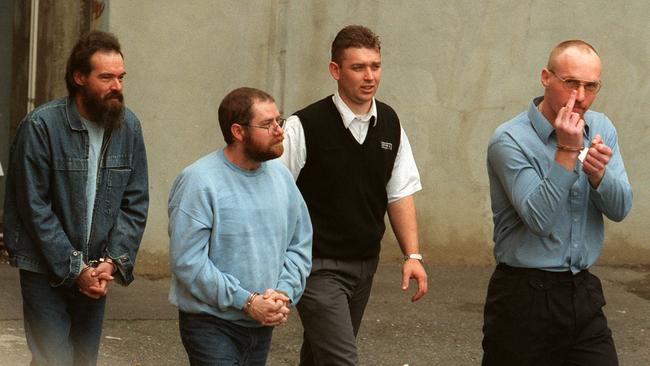SA Government announces legislative rewrite to try and stop ‘bodies in the barrels’ helper Mark Ray Haydon being free
The state government will rush new laws through parliament that could control the movements of the man who helped the Snowtown serial murderers – even after he's freed from jail.

Police & Courts
Don't miss out on the headlines from Police & Courts. Followed categories will be added to My News.
New laws will be parachuted into parliament in an attempt, by the government, to ensure offenders like the “bodies in the barrels” serial killing accomplice are not released from jail unmonitored.
On Monday, Attorney-General Kyam Maher announced a move to extend the definition of a “high risk offender” to include persons convicted of assisting an offender.
That is the very offence of which Mark Ray Haydon was convicted, and for which he has served his entire 18-year non-parole period and 25-year sentence.
Set to go before parliament on Tuesday, the law, if passed, would enforce parole-like conditions upon such offenders – so long as the Supreme Court agrees they are necessary.
Under the proposed laws, a person who breached those conditions – known as “extended supervision orders” – may forfeit their freedom and face the possibility of being made subject to indefinite detention.
At present, Haydon is scheduled to be released from prison on May 21, and existing laws do not permit his freedom to be restrained in any manner.
On Monday, Premier Peter Malinauskas said the change exemplified the government’s “highest priority on keeping the community safe and securing justice for crime victims”.
He said the government believed existing laws were sufficient to convince a court to impose an extended supervision order upon Haydon.
However, as the current definition of a high risk offender only includes those who commit acts of violence, serious sexual offending or terrorism, it warranted improvement.
“The Attorney-General has issued instructions to Crown to pursue an extended supervision order against Haydon,” he said.

“An extended supervision order would mean in the event that Haydon is released (and his head sentence concludes), he will be subject to a whole suite of different measures aimed to keep our community safe if the court deems it appropriate.”
Mr Maher said the high-risk offender provisions were “an important tool to allow the courts to impose strict monitoring provisions on violent offenders”.
“The change we are pursuing to the law today will allow the courts to extend these provisions to monitor those who help these offenders cover up their vile crimes,” he said.
“If you assist someone after the fact and you are hindering a police investigation, you may be allowing someone who might have been caught, might have been apprehended, to commit further crimes.
“If you aid and abet before an offence and during an offence, you come under the definition of a high-risk offender.
“If you help after an offence, the law doesn’t automatically deem you (an offender) and we think that’s a gap that needs addressing.”
Haydon, 65, was convicted of assisting murderers John Justin Bunting, Robert Joe Wagner and James Spyridon Vlassakis.
Wagner and Bunting are serving consecutive life terms for 11 and 10 murders respectively, while Vlassakis received a 26-year non-parole period.
Although Haydon – who did not commit any of the murders – applied for parole in 2017, that bid for freedom was rejected by the Parole Board.
Last month, Parole Board chair Frances Nelson said Haydon’s file indicated “acknowledges his crime, he’s remorseful” and had completed rehabilitation programs.
She said he had also been housed in low-security parts of the state’s prisons “for some time”.
Mr Maher said on Monday measures such as ankle bracelets and curfews would be decided by the court.
“If the court deems someone a high-risk offender, then the court has the ability to impose things like electronic monitoring via ankle bracelet, curfews, where you can go, where you can reside – so it’ll be up to a court to decide if those should be imposed,” he said.
“Earlier in this term of government, we introduced new laws about concealing the body.
“Now under SA law, thanks to this current government, if you conceal a body, you can face up to 15 years of jail for that offence.
“This could have been something that could have been prosecuted if these laws had been in place.”




